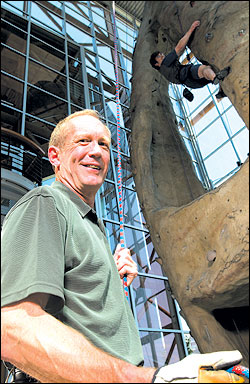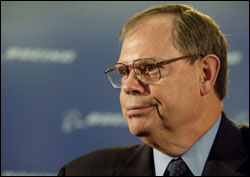The chief executive of REI earned $1.3 million in 2004, his last full year running the Kent-based company. Dennis Madsen, who hired on at Recreational Equipment Inc. in 1966 to stock shelves part time at what was then the Seattle co-op’s only store, retires this month after five years as head of a 2.5-million-member outdoor equipment cooperative, which today has 77 stores in 25 states. Succeeding him will be Sally Jewell, a former Washington Mutual executive and outdoors enthusiast who has been the co-op’s chief operating officer since 2000. Jewell made $966,993 at REI last year. Madsen will pass the torch on Monday, March 28, at REI’s annual meeting in Seattle.
Perhaps those figures, reported here for the first time, are not out of line for a company that had 2004 revenue of $887 million, $44 million of which was refunded to members in the form of an annual dividend on their purchases. But REI is not a typical corporation. As a nonprofit cooperative whose members elect the governing board of directors, it has implied grass roots. REI was founded among climbing friends in 1938, and its mission is to sell good gear at a good price and to encourage stewardship of the environment. In 2004, the company spent $2 million on grants and outreach programs. You pay $15 to join and you get about 10 percent back on your purchases at the end of the year. There are worse places to spend hundreds if not thousands of dollars a year on outdoor gear and clothing, because, it would seem, nobody can get rich under this arrangement.
That depends on your definition of rich. REI, of course, contends that its executive compensation packages are fair. It’s a big business, and the responsibility to succeed is great. In explaining executive compensation on its Web site (www.rei.com), the co-op says, “REI’s pay philosophy for executives is to target base pay at the median of the labor market for similar jobs. Current pay studies show that base pay for the company’s top five most highly compensated executives is at or slightly below market. Because REI is a cooperative, the company cannot provide its executives with stock options. REI does have a long-term incentive plan for senior executives. The plan paid out for the first time in 2004 because of the company’s sustained success calculated over the past three years.”
That long-term incentive plan meant about a 30 percent boost for Madsen in 2004. His compensation of $1.3 million consisted of $515,000 in base pay, $80,221 in profit sharing and pension money, $6,480 in allowances such as a car, $397,480 in annual incentive, and $380,033 in long-term incentive. In 2003, when there was no long-term incentive payment, Madsen earned just over $1 million.The other executives whose compensation REI discloses: Brad Johnson, chief financial officer, $610,804 in 2004; Matt Hyde, senior vice president for merchandising and logistics, $559,167; and Brian Unmacht, senior vice president for sales, service, and store development, $532,326.
The compensation of Madsen, Jewell, and the other executives had never been reported by media until a few weeks ago, when the Anchorage Daily News printed slightly different 2003 figures that the co-op had quietly published—buried, really—on its Web site a year ago. (Those figures have been revised due to an accounting change.) REI posted the 2004 figures last week. Two years ago, when Seattle Weekly published a story about whether REI resembled the cool co-op so many around here grew up with (see “Who Owns REI?” June 18, 2003), the company declined to disclose executive compensation, saying the information was proprietary and competitively important. After reading that, Anchorage attorney and REI member Neil O’Donnell fought to get the information from the co-op and prevailed, leading REI to post the information. But the executive pay data didn’t hit media until Feb. 27, when Daily News outdoors columnist Craig Medred wrote about O’Donnell.
Acquiring this information from REI itself is not easy. You find it by going to the “About REI” page (www.rei.com/aboutrei/about_rei.html), then by clicking on “financial information” in the left menu, which takes you to a PDF document, at the end of which is a link to the 2003 consolidated financial statements, which, when clicked, takes you to a page about how often reports are compiled, with a link at the end of the text to an “overview,” which takes you to a page where Chairman of the Board Bill Britt explains the co-op’s philosophy about compensation, and at the end of that text there’s a link to “details on REI’s executive compensation,” which takes you to a page of more explanation of how compensation is determined, and near the bottom of that page, there’s a link to a Summary Compensation Table, which leads you to a PDF document detailing the past three years of compensation for the co-op’s top executives.
Or you can just type www.rei.com/aboutrei/table.pdf into your browser.
It’s still not clear who owns REI, but it is now possible to learn how much the nonprofit cooperative’s executives are paid.
REI’s annual meeting is scheduled for 7 p.m. Mon., March 28, at the Seattle store, 222 Yale Ave. N. Co-op members are welcome.







